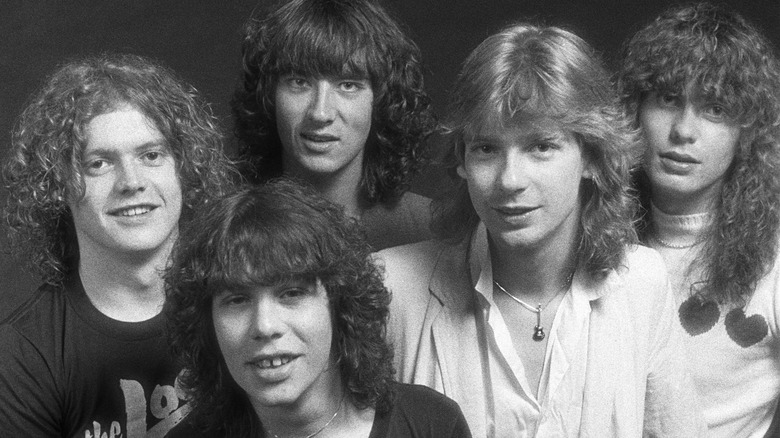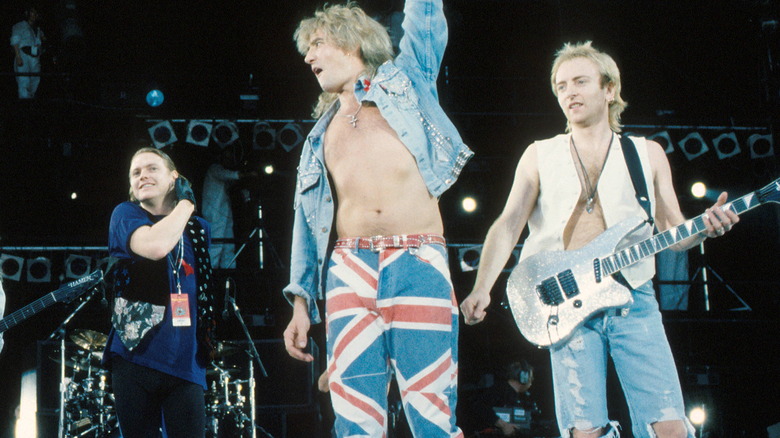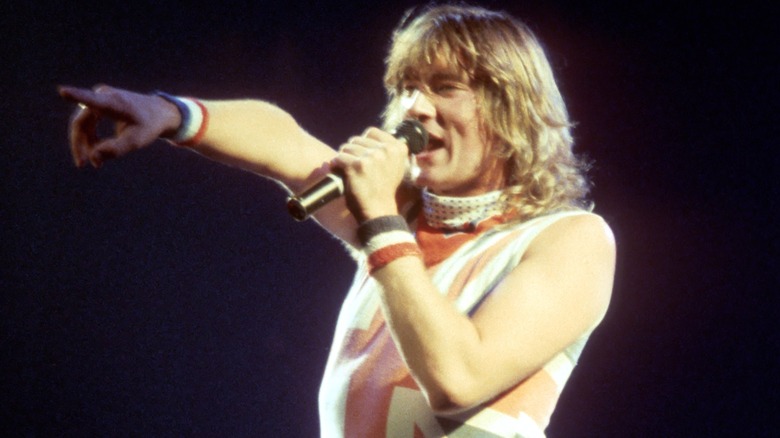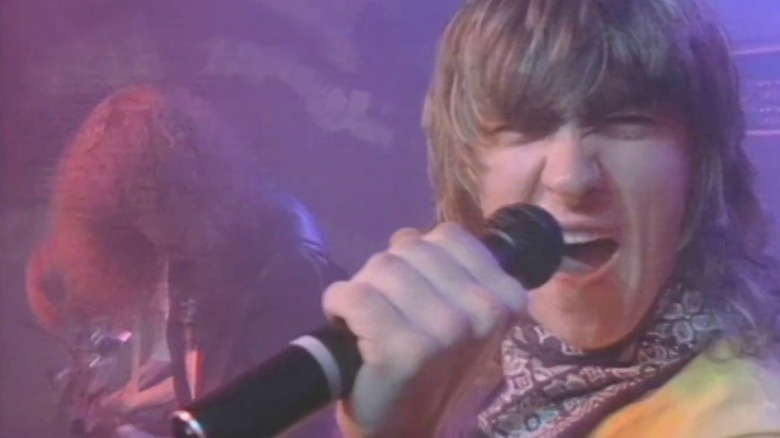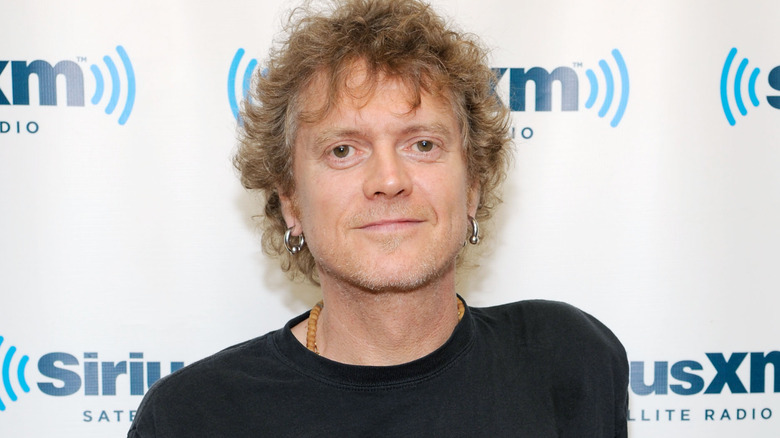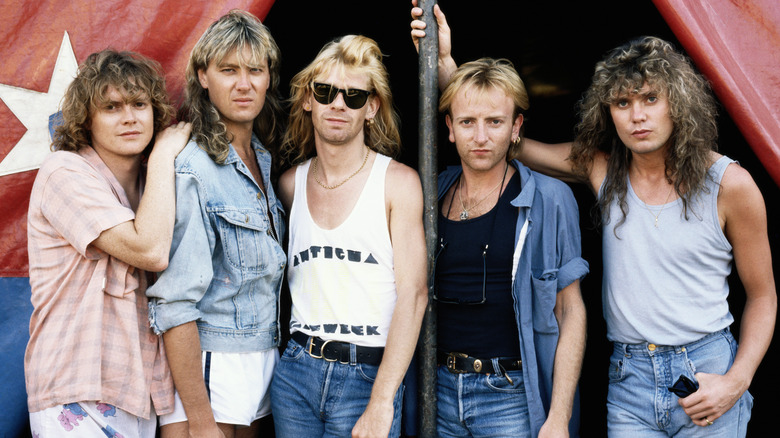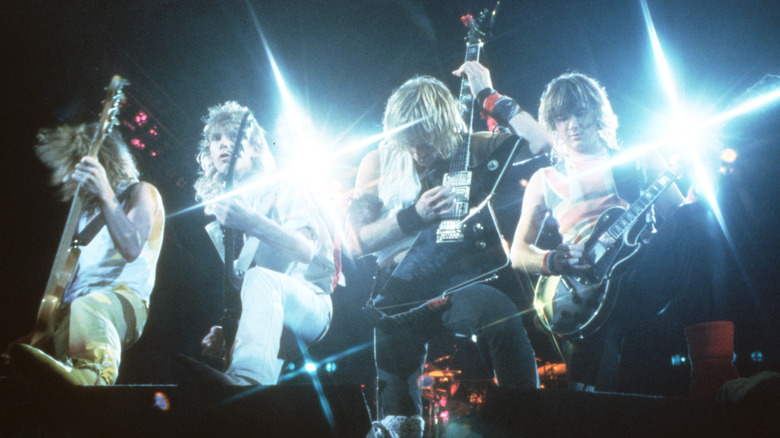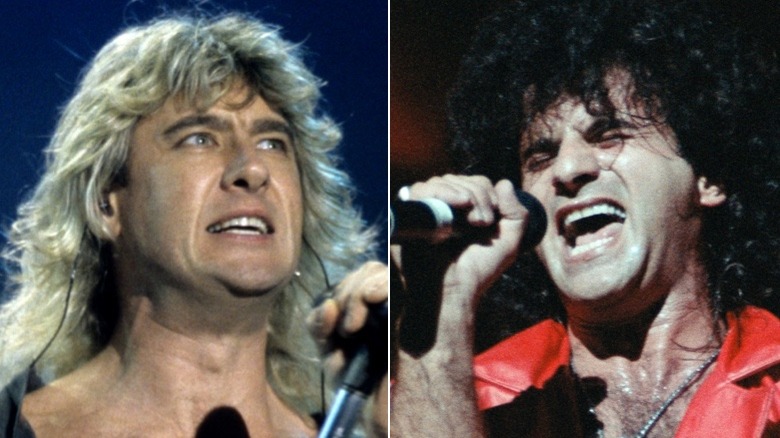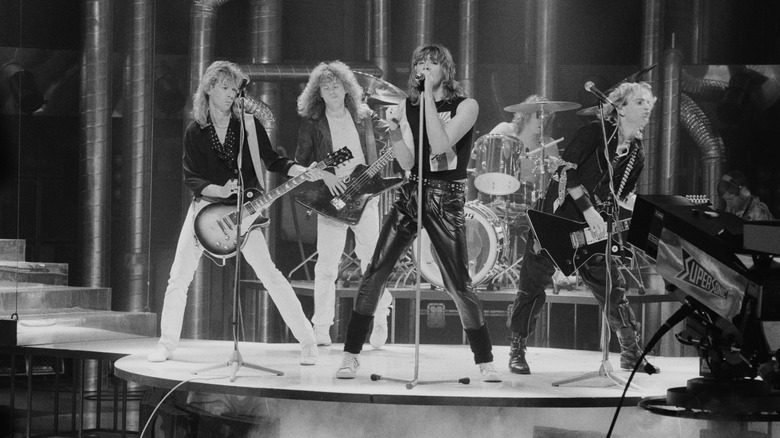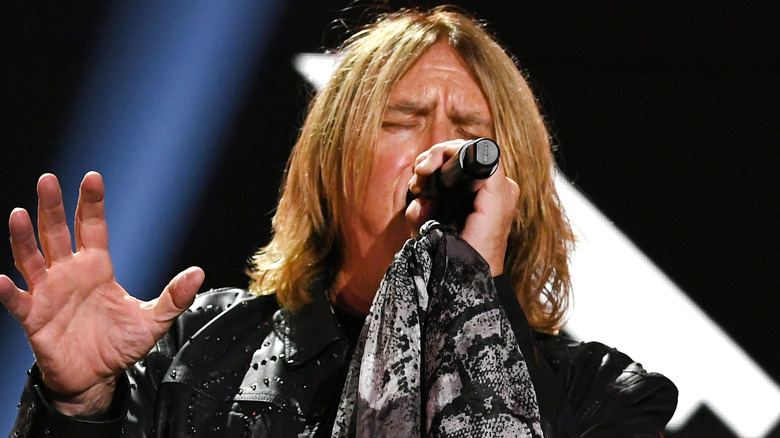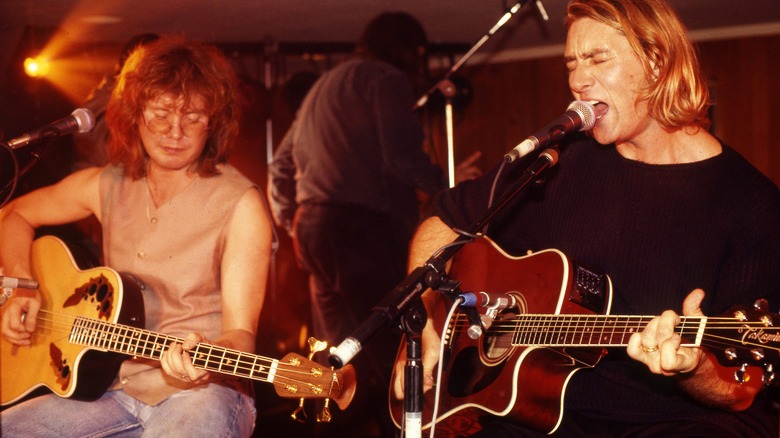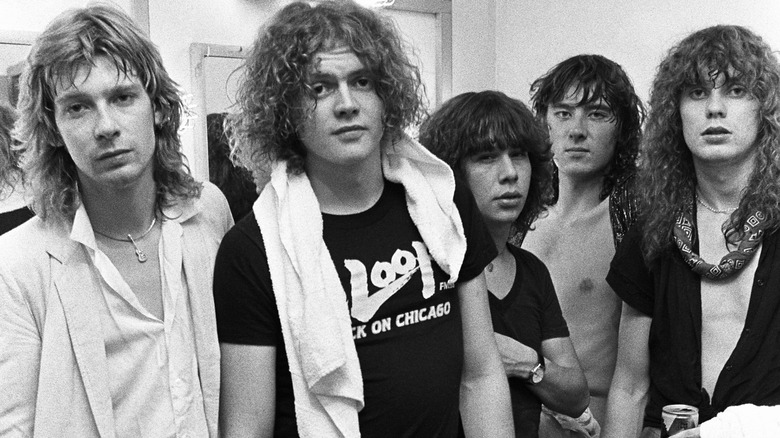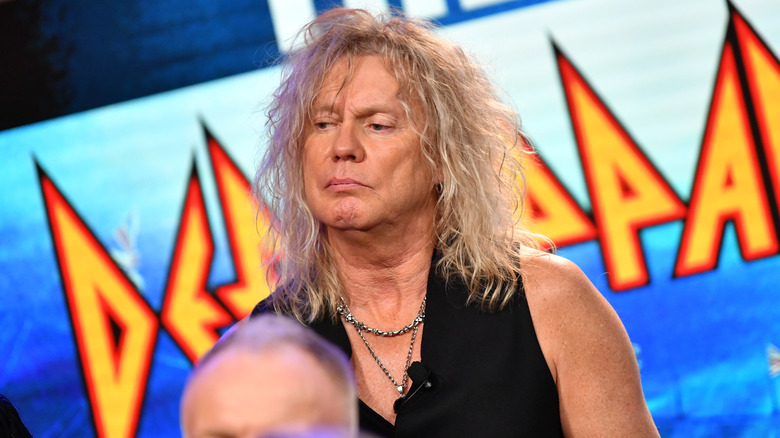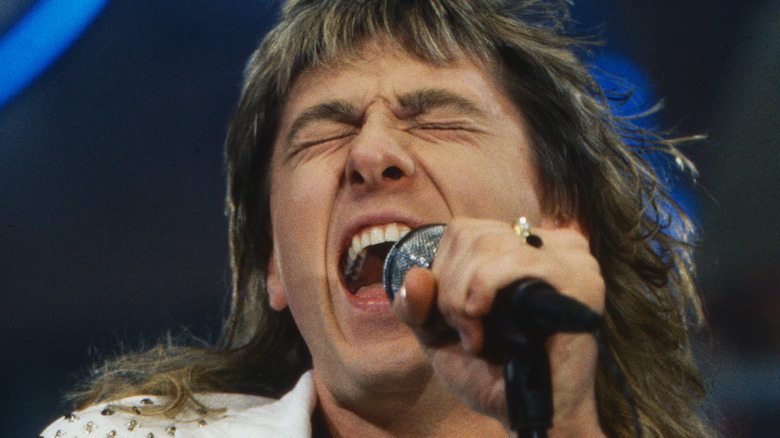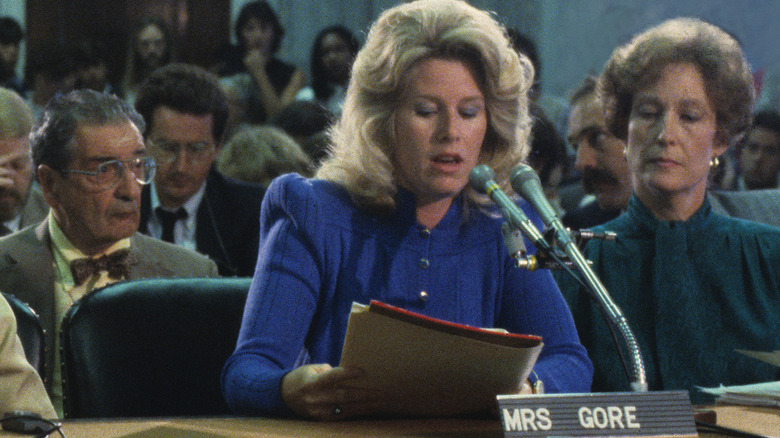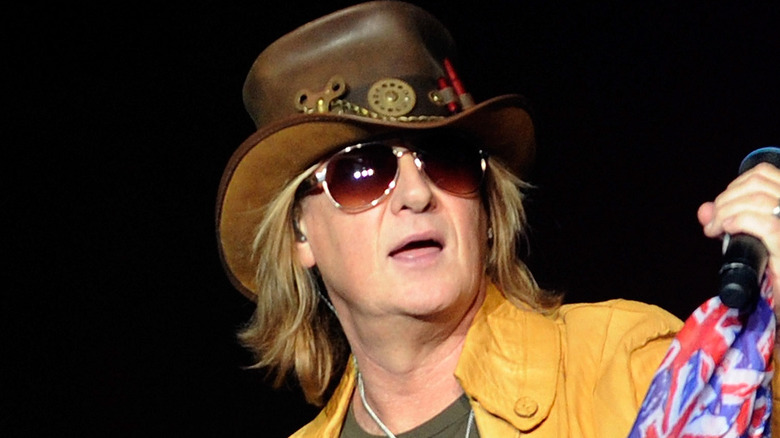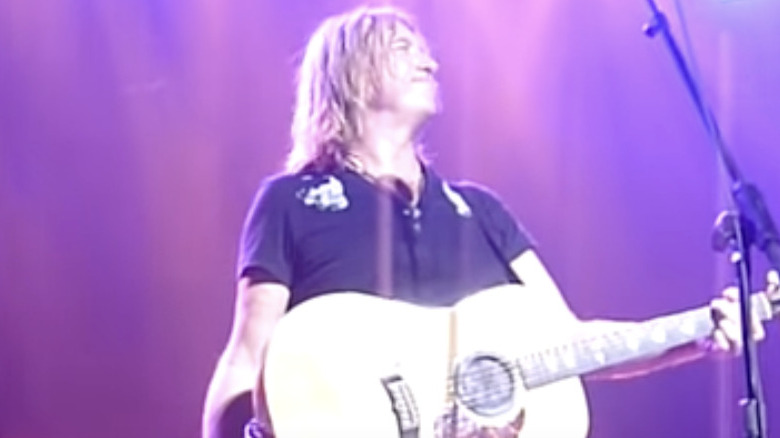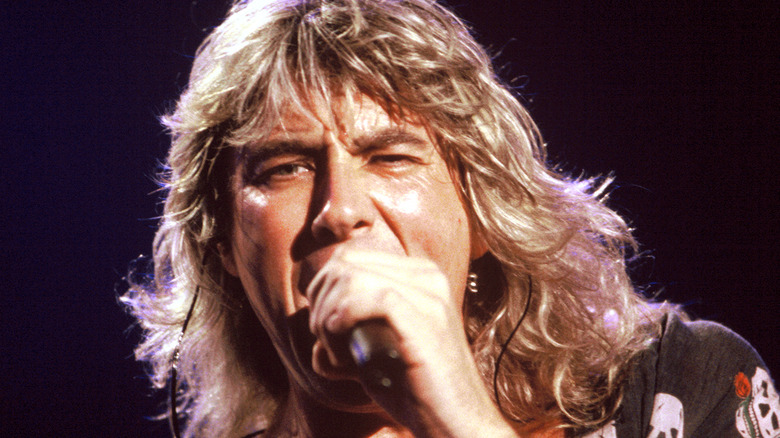The Untold Truth Of Def Leppard
Def Leppard might just be the quintessential hard rock band of the 1980s, although they formed in the late 1970s and kept their sound evolving and the hits coming until well into the 1990s. Formed in the wake of an explosion of British heavy metal that brought the world Black Sabbath and Judas Priest, Def Leppard found an irresistible mix of thundering drums, monster guitar licks, wailing vocals, pop hooks, and a sensibility friendly to radio and MTV. Thanks to the unmistakable voice of Joe Elliott, the shredding of Steve Clark, and the savvy production of Robert "Mutt" Lange, Def Leppard laid out the blueprint for a generation of heavy but melodic rock bands on albums like "Hysteria" and "Pyromania," and on hits like "Photograph," "Love Bites," "Armageddon It," and "Pour Some Sugar on Me."
The members of Def Leppard are in their 60s now and have weathered numerous tragedies and challenges to keep it rocking, both on album and in concert. Here's a look into the four decades of Def Leppard.
Def Leppard consisted of members poached from another band
Def Leppard became one of the biggest bands in the world in the 1980s, finding success relatively quickly after forming in 1977 in Sheffield, England. The band only exists because of a combination of happenstance and nakedly ambitious subterfuge. According to the Rock and Roll Hall of Fame, teenager and budding singer Joe Elliott was late for his bus one day, and while waiting around, met another teen named Pete Willis, who, as fate would have it, was a wannabe rock star, too. They hit it off, and before long Willis introduced Elliott to his band Atomic Mass, which counted among its members bassist Rick Savage. But Elliott didn't want to join this pre-existing, developing collective — he had his own ideas about the kind of rock band he wanted to form, one that mixed heavy metal guitars with pop-friendly melodies. The name he had in mind: Deaf Leopard.
Willis and Savage were intrigued and left Atomic Mass to join Elliott's project. The band quickly took form, adding guitarist Steve Clark, changing its name to the phonetically identical but way more metal Def Leppard, and recorded its first EP, "Getcha Rocks Off," in 1978.
The real reason Def Leppard rocks the Union Jack
"The Union Jack" is the national flag of the United Kingdom, and two native acts have used the pattern as the cornerstone of their look: Ginger Spice of the Spice Girls, and Def Leppard. Rocking the red, white, and blue flag of their homeland was more than a matter of national pride and showing off their Britishness — in fact, it all started inadvertently and stretched back too early in the band's history.
According to singer Joe Elliott in a SiriusXM interview, drummer Rick Allen wore Union Jack short-shorts as early as 1981, but "nobody took any notice," likely because Allen's bottom half was hidden behind a drum kit. Then both Allen and Elliott wore Union Jack-wear in the 1983 video for the single "Photograph." Elliott had 25 pounds allocated for an outfit for the clip, and he headed to London's King's Road fashion district. After he bought what he wanted, he had eight pounds left — just enough to buy a 7.99 Union Jack shirt.
After he sported that in the video — which also included a shot of Allen in his British shorts jumping off the drum riser in slow motion — fans started wearing Union Jack clothes to shows, and the band decided to make shirts like Elliott's for the merchandise table. "We thought it was hilarious, all these Americans buying this Union Jack shirt, and like 200 years ago they'd be kicking us out of the country," Elliott said.
British band Def Leppard was bigger in America first
Def Leppard is a definitive and unquestionably British band — members even popularized Union Jack clothing. And yet, the group had a hard time finding attention or success in its own homeland. None of its first singles from the late '70s and early 1980s — not even the catchy, eventual radio staples like "Photograph" or "Rock of Ages" — made it above No. 41 on the U.K. singles chart.
Their first two albums fell off the British album chart quickly as well, but by the time the group was recording a video for "Photograph," single number one off of album number three, "Pyromania," they didn't have very much working capital, as singer Joe Elliott discussed with SiriusXM.
Fortunately, the video for "Photograph" is what broke the band... in America, at least. Its release in 1983 coincided with the rapid adoption of a new way to consume music. "It went through the roof because of MTV. Once people started getting cable all over the States, this fledgling MTV thing took off," Elliott told SongFacts. MTV airplay led to radio airplay, which in turn led to more MTV play, and "Photograph" hit No. 1 on Billboard's rock chart — its first of 17 top ten placings on that list. Only after Def Leppard found fame in America did they get successful in their homeland — the single "Animal" was the group's first hit in the U.K., arriving in 1987.
What's that German at the beginning of Def Leppard's Rock of Ages all about?
German-language music was all over English-language radio in the mid-'80s. Nena's "99 Luftballons" hit No. 2 on the pop chart. Falco topped it with the partially German "Rock Me Amadeus" in 1986, and Def Leppard scored one of its earliest hits with "Rock of Ages," a song which begins with the musically unaccompanied voice of a high-patched individual stating, roughly, "Gunter, gleiben, glauten, globen." (The well-known bit reached millions of new ears over a decade later when the Offspring used it in its hit "Pretty Fly (For a White Guy).")
Don't bother running it through an online translator to find out the true meaning of this possibly secret message — according to the Def Leppard FAQ, it doesn't "mean" anything. While recording the song, producer Robert "Mutt" Lange grew so weary of giving a 1-2-3-4 countdown for takes that he began to make up funny nonsense phrases instead.
Another tough-to-decipher lyrical moment obsessed Def Leppard fans — exactly what Joe Elliott slurs at the end of the band's No. 1 hit "Love Bites." In the late '80s, some fans believed that right after Elliott sings, "If you got love in your sights, love bites," he says, "Jesus of Nazareth, go to h***." He doesn't make such incendiary remarks at all. What actually showed up on the recording: producer Lange quipping, "Yes it does, it does, bloody hell," regarding how love, indeed, bites.
Drummer Rick Allen of Def Leppard lost his arm and kept on playing
During a holiday break from the rigors of Def Leppard on Dec. 31, 1984, drummer Rick Allen was driving outside Sheffield, England, in his Corvette Stingray. He didn't judge a curve correctly, lost control, and slammed at high speed into a stone wall, then flipped the car a few times. Despite wearing his seatbelt, Allen was thrown from the car. He got up, conscious, only to discover that his left arm had been torn off in the accident.
A police officer soon arrived, as did a nurse who lived nearby, who had a cooler of ice with her in preparation for a New Year's party. Together they located the arm, loaded it up, and sent it with Allen to Royal Hallamshire Hospital. Microsurgeons worked for 10 hours to reattach the arm, but complications ensued, leading them to believe that Allen's best shot at survival would mean a full amputation of the arm. And just like that, the 21-year-old drummer in one of the biggest bands in the world lost a limb — he lived, but his livelihood was threatened.
Amazingly, while still in the hospital recovering, Allen started devising ways to keep playing the drums. Realizing that he could keep pretty good time with his feet, he developed a custom-made drum kit that runs with the assistance of Allen's remaining appendages and electronic programming.
The first version of Def Leppard's Hysteria was totally scrapped
"Hysteria" is a landmark album of the 1980s. The 1987 Def Leppard LP bridged the harder-edged British metal of the '70s with the slick, L.A. hair metal of the late '80s. The album's fresh but familiar, accessible but authentic sound propelled sales to more than 20 million copies, and all that may not have happened had "Hysteria" gone as originally planned. According to Classic Rock, Producer Robert "Mutt" Lange was on board early, having made Def Leppard's "High 'n' Dry" and "Pyromania", and the band shipped off to Hilversum, Holland, to start recording.
Lange pulled out, too tired after working on the Cars' "Heartbeat City." Group management had a replacement in mind and installed Jim Steinman as producer, even though he was more of a writer than knob-twirler and was known for his distinctive, overly theatrical style as heard on Meat Loaf's "Bat Out of Hell." He wasn't a good fit. At various points, he thought the band tuning their instruments was a "take," he'd show up three hours late to sessions and bafflingly ask the band to play more "oily," and then wanted to change the carpet in the studio because he didn't like it. After eight half-finished songs, Def Leppard forced management to buy Steinman out of his contract. After a delay due to Rick Allen's accident and rehabilitation, Lange was ready to go again, and he produced "Hysteria" after all.
Def Leppard had impossibly high goals with Hysteria
Emboldened by the multi-platinum success of 1983's "Pyromania," which also packed a whopping six singles that hit the top 40 of the American rock chart (including "Photograph," "Rock of Ages," and "Foolin,'") Def Leppard and producer Robert "Mutt" Lange set out with even loftier ambitions for its follow-up, the album that would become 1987's "Hysteria." "Mutt said: 'Let's make a rock version of Thriller — an album you can have seven singles off," guitarist Phil Collen said (via Classic Rock), suggesting the all-hits, no-filler approach that guided Michael Jackson's blockbuster 1982 masterwork. "And we did."
The voluminous singles idea got back to Def Leppard's cover designer, Andie Airfix, who in the mid-1980s was dealing with a monumental shift in his profession: vinyl records, with their huge covers, were on the way out, in favor of compact discs and their tiny cases. He approached designing the art for "Hysteria" as "a defiant celebration of 12-inch vinyl before its anticipated demise."
Airfix's cover was designed with an eye toward breaking down the image into nine separate and distinct sections (in case Def Leppard over-realized its lofty goal and released nine singles). Those constituent panels then became the artwork for the "Hysteria" commercial singles, which included "Animal," "Pour Some Sugar on Me," and "Love Bites."
Def Leppard vs. Krokus
Def Leppard hit big in the U.S. in 1983 with the album "Pyromania," particularly because of the single "Photograph," which enjoyed heavy rotation on the then-new all-music video cable network called MTV. The band hit the road, touring to some of the biggest arenas in the U.S., packed with fans, and enlisted Swiss hard rock band Krokus to be its opening act. While there was certainly some overlap in terms of sound and fanbases, the arrangement didn't go well.
According to Classic Rock, on the very first night of the tour, the members of Krokus were told to stay off the ramps and scaffolding on stage, as those had been built and reserved specifically for choreographed movements by Def Leppard singer Joe Elliott. Singer Marc Storace ignored that directive almost immediately, and after seeing Def Leppard's show once, he lifted and repeated all of Elliott's moves. When Def Leppard performed, it made them look like the ripoff artists. Krokus's manager Butch Stone bragged about this to the press, and then a physical fight broke out between him and Leppard's Rick Allen. "It became very ugly, and when our manager punched the drummer, naturally we were dumped from the tour," Krokus' Chris von Rohr said.
The sad reason why Vivian Campbell joined Def Leppard
Steve Clark was a member of Def Leppard's original lineup in the late 1970s. Clark was a heavy drinker, and by the late 1980s, it posed serious problems to his own health and the state of Def Leppard. According to band member Phil Collen in his memoir "Adrenalized" (via Classic Rock), Clark was discovered unconscious in a Minneapolis bar and was taken to a hospital, where doctors explained his blood alcohol level was 0.59 — more than the 0.41 rate registered by Led Zeppelin drummer John Bonham when he died from alcohol poisoning. The band helped Clark get into a rehab center, but when he got out, he started relying on substances again.
In January 1991, during a six-month leave of absence from Def Leppard to see to his health and get sober, Clark died in his sleep. Per Loudwire, an autopsy showed that Clark died of the effects of accidentally overdosing on alcohol, codeine, and painkillers. Def Leppard continued on, and in 1992 started playing shows with a new guitarist: seasoned metal guitarist Vivian Campbell, a veteran of Dio and Whitesnake.
The secrets of Def Leppard's unique stage layout
Def Leppard toured in support of "Hysteria," and after a few concerts in Europe, the rock n' roll road show came to the United States, kicking off in Glen Falls, New York, on October 1, 1987. That night, the band also launched an innovative concert format devised by manager Peter Mensch in which they played "in the round" — on a stage in the middle of an area, surrounded by seating on all sides. "We just did not know how it was going to work because we knew wherever you were on stage, you would always have your back to some part of the audience," bassist Rick Savage told Billboard, adding that he was totally gassed by the middle of the show because of all the "running around."
The lack of a backstage area presented other challenges — specifically, where would Leppard-loving groupies hang out? The crew had a solution. "They had roadies pick girls out of the audience and they'd take them underneath the stage," Def Leppard's label connection Jim Urie explained. The seating arrangement also made it tough to get equipment and people onto the stage. According to guitarist Phil Collen's memoir "Adrenalized" (via Rolling Stone), crew members got the band onto the stage by hiding them in huge laundry baskets and then quietly wheeled them down the aisles.
Singer Joe Elliott of Def Leppard lost his voice
In January 2016, Def Leppard set out on "Hysteria on the High Seas," a concert series set on the MSC Divina cruise ship. However, just before Def Leppard set sail, singer Joe Elliott fell extremely ill, contracting pneumonia and a brutal cough to go with it — detrimental ailments for a rock vocalist. "It totally destroyed my vocal cords, to the point where my throat doctor said to me, 'If you weren't you, I'd tell you to retire because this is never going to get better,'" Elliott told Express.
Still, he embarked on "Hysteria of the High Seas" but ultimately couldn't sing. He'd introduce the band and then watch offstage as bandmates Vivian Campbell and Phil Collen took turns filling in on vocals. For the next set of cruise dates, Elliott still hadn't recovered, so Def Leppard recruited a rotating group of replacement vocalists, which included Mr. Big's Eric Martin and WInger's Kip Winger. Elliott called listening to other people sing his songs "the weirdest thing" he's ever seen.
Def Leppard cancelled future tour dates while Elliott could begin the grueling rehabilitation process. "I had to take five months of working every single day for an hour or two with my vocal coach," he said. "And it took me about 18 months to totally get my voice into a condition where I was happy with it."
Def Leppard set a world record
Def Leppard made rock n' roll history and rank among the most quantitatively successful acts of all time, selling 100 million albums over the last 40 years, ranking with the likes of the Beatles and Michael Jackson. But Def Leppard is all alone in another category — in 1995, the hard rock band set a difficult-to-accomplish world record, which remains unchallenged or topped more than 25 years later.
As a publicity stunt to promote the release of its first ever best-of collection "Vault: Def Leppard Greatest Hits (1980–1985)," the group played an all-acoustic show in Tangiers, Morocco, on October 23, 1985. Then, the band hopped onto a plane for a flight to London, England ... where they played a second acoustic concert. After that wrapped, Def Leppard took another jet, halfway across the world, to Vancouver, British Columbia, where they played their third and final acoustic set of the day. Never before had a musical group played three shows on three different continents (Africa, Europe, and North America) all in one 24-hour period.
Def Leppard lost some early members
According to VW Music, Def Leppard started out when some friends from Tapton School in Sheffield, England, created a band in the mid-1970s called Atomic Mass, which quickly evolved into Def Leppard. Bassist Rick Savage and drummer Tony Kenning were the founding members, bringing in guitarist Pete Willis who in turn recruited singer Joe Elliott.
After just 15 months as the drummer for Def Leppard — a name he helped create and for whom he found rehearsal space — Kenning was out of the band. "The short answer would be a perceived lack of commitment on my part" was the reason for his dismissal, according to Kenning. His replacement: 15-year-old Rick Allen, according to Classic Rock.
Rhythm guitarist Willis wouldn't make it for the long haul with Def Leppard either. His playing appeared on the band's first two albums, and he toured the U.S. with the band in 1981, where his alcohol consumption affected his attitude and abilities. "Every time he had a drink it would completely change his personality," Allen said. "We had fisticuffs about it, and tears," Elliott added. "Pete must have been given a hundred chances." Willis was so unreliable that Elliott put guitarist Phil Collen on standby, calling him at his home in the U.K. and asking him to quickly learn the band's set list. Def Leppard officially fired Willis in 1982, per Express, and Collen got his job.
What's a Def Leppard anyway?
"Def Leppard" is one of the more memorable band names, and one of the most playfully metal, on account of how it consists of two words which are both boldly and blatantly misspelled. Singer Joe Elliott came up with the name while doodling rock-based images. "Joe used to make posters up for bands whilst at school and started making up band names and then making posters for them," the group's first drummer Tony Kenning told VW Music. One of those posters bore the words "Deaf Leopard" and he showed it to his bandmates as a potential group name. "We thought the name was pretty cool and later I suggested changing the spelling to 'Def Leppard,'" Kenning added.
As for the similarities to the name of a certain predecessor hard rock band, Elliott claims it's a coincidence. "We didn't notice that it looked like Led Zeppelin. Whoops!" he told Speakeasy.
The unlikely and varied origins of Pour Some Sugar on Me
"Pour Some Sugar on Me" was a monster hit for Def Leppard in 1987. The arena rock-meets-metal singalong hit No. 2 on the Hot 100, and it's a time capsule of where pop music was heading at the time. Not only was radio-friendly pop-metal picking up steam, but so was hip-hop, and Def Leppard pulled from the rise of rap by cribbing from another rock band appropriating the conventions of the genre. "When we did 'Pour Some Sugar on Me,' it was only written because Run-DMC and Aerosmith had done 'Walk This Way.' All of the sudden, rock and rap did mix, so we wrote our own," Def Leppard singer Joe Elliott told Kaos2000 (via SongFacts).
The song's origins are almost accidental. Def Leppard had nearly finished recording the album "Hysteria" and had spent two years completing 11 tracks. Elliott started messing with a new idea that he had for a song that he started playing on an acoustic guitar in the studio when he was all alone; the rest of the band were on sabbatical and engineer Mutt Lange had taken a break. "I just started playing this riff, chorus, thing, three-chord turnaround, and singing the chorus I guess," Elliott said in a video on the band's YouTube channel. At that point, Lange returned, and, calling the bit "the best thing I've heard for many a year," immediately started to record the song as he and Elliott fleshed it out.
Def Leppard vs. Tipper Gore
In 1985, Tipper Gore, wife of Senator Al Gore, formed a committee with other congressional spouses (and concerned parents) called the Parents Music Resource Center (PMRC). According to Rolling Stone, Gore and her cohort held hearings about the perceived rise of perverse, profane, and inappropriate content in pop and rock music, and the need for a rating system to alert parents of impressionable young listeners. The proposed rating system included "X" for sexual content, "V" for violence, '"O' for references to the occult ... [and] 'D/A' for lyrics about drugs and alcohol." The PMRC singled out 15 songs as the most egregious and representative offenders, including hard-edged tunes by metal bands like Judas Priest, W.A.S.P., and Motley Crue, as well as "High 'n' Dry (Saturday Night)," a 1981 album deep cut by Def Leppard, who by 1985 had moved to a more innocuous, pop-friendly sound. "High 'n' Dry" is about day drinking, but it wasn't a hit or even a single in the United States.
Joe Elliott of Def Leppard defended his band against attacks. Rock n' roll songs about partying and drinking were "part of the entertainment," he said (via Laura S. Jeffrey's "Def Leppard: Arena Rock Band"). "The kids like us to do that. We like to do as well, but we don't write about it all the time. And a lot of people seem to think that that's it."
The misheard words of Def Leppard
"Backmasking" is a rock music phenomenon from the latter part of the 20th century. It involved artists or producers inserting backwards dialogue or singing into songs that, when played in reverse on a turntable, revealed a secret message to keen-eared fans who put in the extra effort. Def Leppard experimented with backmasking and hidden messages here and there, and it generated both mystery and controversy. On its late '80s hit "Rocket," for example, a strange voice can be heard near the beginning of the song. Reversed, it's merely Def Leppard's Joe Elliott singing "We're fighting with the gods of war," a clip from the group's own "Hysteria" track, "Gods of War."
Def Leppard only hit No. 1 on the American pop chart once, and that was with "Love Bites" in 1988. But for years, the band dealt with a rumor that near the end of the song, there's a hidden message that makes a crude reference to Jesus Christ. In 1997, Def Leppard's Phil Collen refuted the idea once and for all in a Q&A for Mercury Records' website. "For the last time. There is no reference to Jesus Christ," Collen explained. "There is however a keyboard vocader [sic] making fun of a Yorkshire accent."
Def Leppard started two major rock fads
With just one song, Def Leppard inspired two major movements that would become hallmarks of hard rock and hair metal in the 1980s. In 1981, Def Leppard included the guitar-driven ballad "Bringin' on the Heartbreak" on its album "High 'n' Dry." The song didn't go anywhere and remained a mostly forgotten album cut until 1984, when, following the release of smash-hit LP "Pyromania," and to hold off fans and stay relevant until "Hysteria" would hit stores in 1987, Def Leppard issued a remix of "Bringin' on the Heartbreak" (per Ultimate Classic Rock). This time, the song made a respectable showing on the Billboard Hot 100 pop chart, but showed other hard rock bands that they could similarly find airplay and financial success by showing off their softer side in the form of a power ballad. Some examples of later power balladry: "Heaven" by Warrant, "Every Rose Has Its Thorn" by Poison, and "Home Sweet Home" by Motley Crue.
When Def Leppard would play "Bringin' on the Heartbreak" live, they quickly got bored with the arrangement. "We thought it would be great if we started it acoustic and then went into Steve Clark's solo," band guitarist Phil Collen told SongFacts. Before long, a number of other prominent hard rock bands were eschewing the electric guitars for acoustic ones, including Def Leppard's tour mates Tesla, as well as Scorpions and Bon Jovi.
The strange path of Miss You in a Heartbeat
Def Leppard wrapped up a decade-plus of pop chart success with "Miss You in a Heartbeat." The 1993 single reached No. 39 on the Billboard Hot 100, marking the last time Def Leppard would hit the Top 40. It was a bit of a departure for the band, as it was a tender ballad (not a screeching guitar jam) and also the only Def Leppard song written entirely by guitarist Phil Collen on his own. Also unlike most other Def Leppard songs, it's not about romantic love or rock n' roll.
"Rory, my son, when he was a little baby, that's when I wrote that about missing the family and all that stuff," Collen told SongFacts. But Def Leppard didn't initially record the tune, as Collen gave it to his friend, Bad Company singer Paul Rodgers, to record with his supergroup The Law. That version of "Miss You in a Heartbeat" was an extremely minor hit on American rock radio in 1991. Def Leppard then decided to give it a go, and their version became a smash in the Philippines and Canada, despite being issued as the B-side of another single. Finally, in 1993, Def Leppard put out "Miss You in a Heartbeat" in the U.S., where it performed well.
Def Leppard's legal issues
According to Billboard, boy band sensation One Direction topped the album chart in December 2013 with "Midnight Memories," powered in part by an anthemic hard-rocking title track with a chorus that, to some, bore more than a passing aural resemblance to the hook of Def Leppard's 1987 staple "Pour Some Sugar on Me." The Mirror reported that Def Leppard consulted its lawyers to check if the songs were so similar as to invite a lawsuit or a revision in songwriting credits on the more contemporary song. Members of Def Leppard ultimately publicly acknowledged similarities, but declined to file any suits over it. "The chords are one-four-five. Those are the blues. You don't get more basic than that," guitarist Vivian Campbell said. "I think what's more reminiscent of the Leppard thing is the production, the sound, the vocals, the reverb and the way it's assembled."
But back in 2009, according to Courthouse News Service, Def Leppard found itself on the other side of the lawsuit, named as the defendants in suit filed by Trudy Green Management. The company claims that it agreed to handle the band's affairs in tandem with HK Management, for a 7.5% commission. After handling a 2008 Def Leppard tour of Europe, Green alleged that she was never paid (after she had been fired mid-tour).

